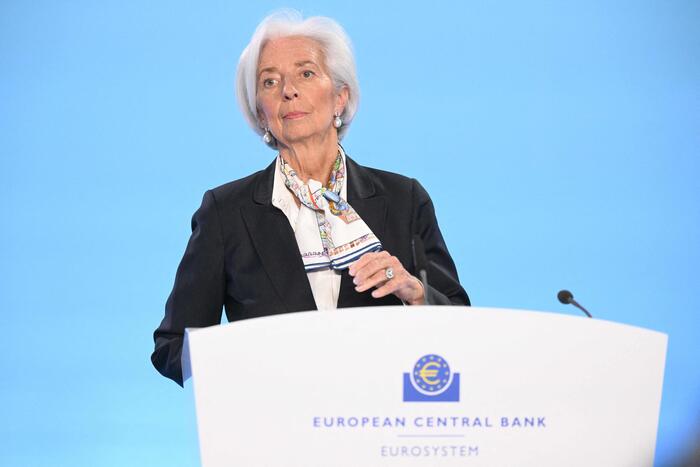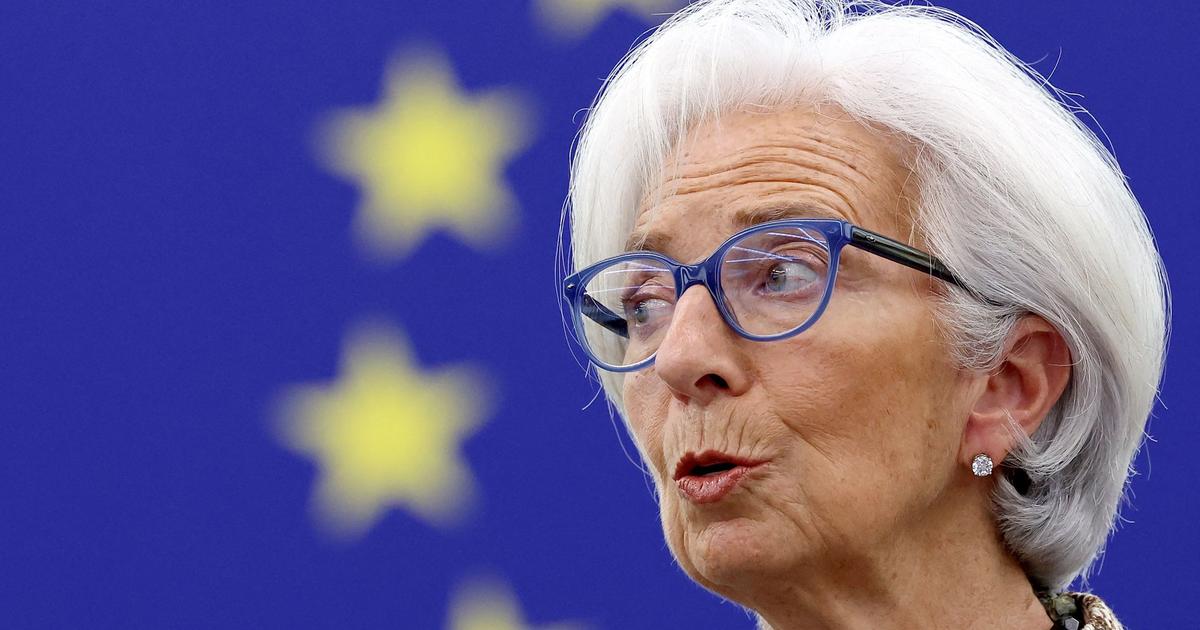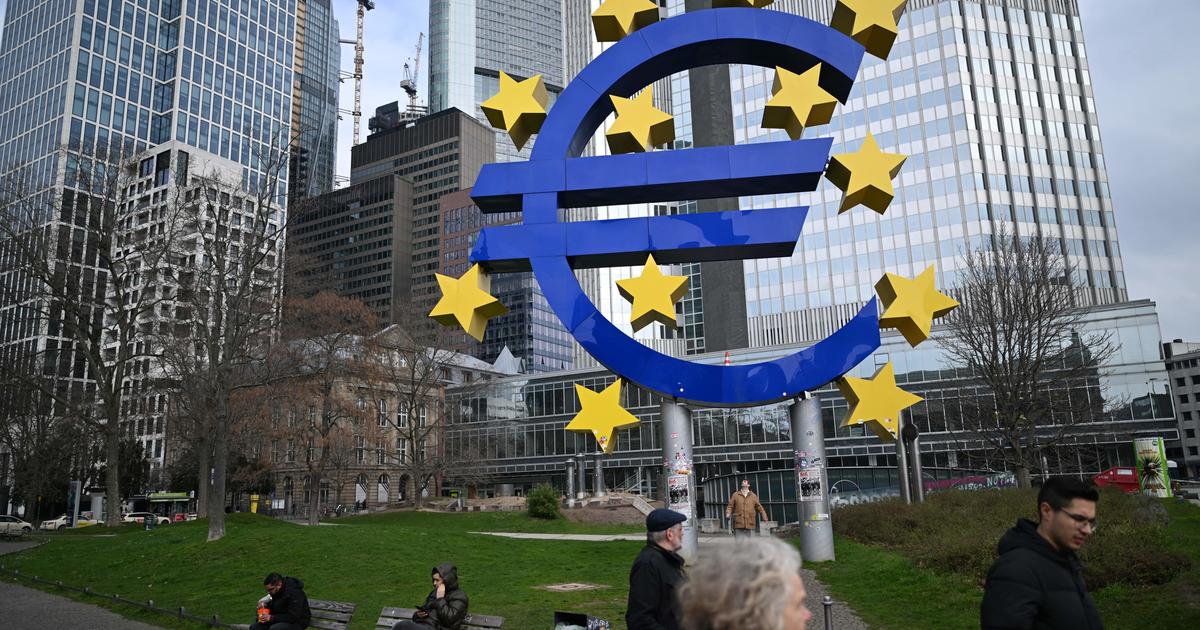Enlarge image
European Central Bank President Christine Lagarde: "She is a lawyer and can get along with other people, deploying empathy, charm and humor."
Photo: DANIEL ROLAND / AFP
DER SPIEGEL:
Mr. Marsh, Christine Lagarde became president of the European Central Bank on Nov. 1, 2019. How would you rate her first two years in office?
David Marsh:
I would give her a medium grade.
On the one hand, she has pacified the most important body, the long-divided ECB Governing Council.
On the other hand, under her direction - mainly because of the COVID-19 crisis, for which she naturally bears no responsibility - the ECB's dependence on euro-area governments has increased.
She doesn't have any deep fundamental principles when it comes to monetary policy.
DER SPIEGEL:
What do you mean by that?
Marsh:
She says that she is neither a hawk, ie a monetary policy hardliner, nor a dove.
Someone like her, who can live with an ultra-loose monetary policy for a long time and who also reflects the overriding, somewhat dovish character of the council, may be appropriate for the current situation.
But it's an open question whether this will be just as useful for the remaining six years of her mandate.
DER SPIEGEL:
First things first: How did she pacify the Governing Council?
Marsh:
Her predecessor, Mario Draghi, was a thoroughbred economist and central banker.
He was convinced that he was right and was hardly interested in what his colleagues on the Council thought.
His economic arguments bore the intellectual rigor of his doctoral studies at the Massachusetts Institute of Technology, and of his Jesuit upbringing.
Lagarde follows a different, more mollifying approach.
From the beginning she tried to accommodate hawks like Dutch central bank president Klaas Knot and Bundesbank chief Jens Weidmann, to demonstrate that she took them seriously.
She is a lawyer and can get along with other people, deploying empathy, charm and humor.
DER SPIEGEL:
Lagarde has a reputation for being a good communicator.
Has this impression been confirmed?
Marsh:
Internally, definitely yes.
The hawks believe the climate has greatly improved.
They know that Lagarde understands less about the technical side of monetary policy than they do, but also that she has other talents.
DER SPIEGEL:
Such a thing?
Marsh:
Her persuasiveness, her many years of experience as managing director of the International Monetary Fund, her contacts in politics, especially with French President Emmanuel Macron.
But also, the connections she has established in the US, Germany and Italy.
DER SPIEGEL:
The mood may be better, but Weidmann has nevertheless announced that he is resigning at the end of the year.
He seems frustrated by his lack of power on the Council.
That makes it seem as though things haven't actually changed much under Lagarde's leadership.
Marsh:
That's right.
Weidmann did his best to convince the other Council members of the validity of his conservative monetary approach.
But in the end - given his permanent status as leader of the Council's orthodox minority - the results have been rather meager.
In addition, because of his ordo-liberalistic principles, he has fallen out with Europe's most powerful politicians - Macron and Italian Prime Minister Mario Draghi.
DER SPIEGEL:
His resignation, then, can be seen as his way of escaping the corner into which he has painted himself?
Marsh:
It seems so.
After all, despite his young age of 53, after 10-and-a-half years in the job, he is the third longest-serving president of the Bundesbank, after Karl Blessing and Karl Otto Pöhl.
On the other hand, he has now unnecessarily brought the office of Bundesbank president into the ongoing negotiations over Germany's next governing coalition.
The issue will be tied up with unseemly political skirmishing that has precious little to do with monetary policy.
DER SPIEGEL:
Weidmann's predecessor, Axel Weber, also gave up in 2011 out of irritation over ECB policy. Does that not demonstrate that the Germans, or at least elements of the country's political class, have never really come to terms with eurozone membership?
Marsh:
I would put it in a more nuanced way: The Germans have had to face up the fact that they are not alone in the world. Thirty years ago, I wrote: "The Bundesbank is much too powerful to be controlled by others. But it has too much power to rule alone." In 1999, Germany would not have accepted an immediate takeover of the Bundesbank by the ECB - which, at that time, did not have its current significance. Instead, we have seen a slow transformation, a gradual de-Bundesbankisation of the German central bank . Weidmann's departure is the latest step in a long journey. Germany's leaders should have prepared the electorate for the final destination on this voyage. Angela Merkel did not want to - or could not - do this and has left it to Olaf Scholz. Perhaps that is Jens Weidmann's farewell gift to the new chancellor.
DER SPIEGEL:
Olaf Scholz, the Social Democrat who is likely to move into the Chancellery once coalition negotiations are complete, will have a significant say in who gets the job.
What kind of successor should the federal government appoint?
Another hawk, to mollify the German public?
Or a dove who won't resign in frustration after a few years?
Marsh:
The successor will have to be a new type of president.
If Isabel Schnabel, professionally qualified as she is, switched from the ECB to the Bundesbank, it would be a setback for Claudia Buch, who in return would have to transfer to the ECB to maintain gender balance, a rather inefficient changeover.
I would prefer a tandem solution, as has already been successfully practiced at the Bundesbank over the years.
DER SPIEGEL:
What might that look like?
Marsh:
The rather apolitical Claudia Buch would take over the presidency for two years until the end of her eight-year mandate.
Marcel Fratzscher - the former ECB official who has close ties to the Social Democrats, is president of the Germany Institute for Economic Research, and is a man of great renown well beyond Germany's borders - would become vice president for two years, with a strong international focus, and then would take the presidency.
But the longer the procedure goes on, the more political it will become.
DER SPIEGEL:
Why?
Marsh:
Because there is a risk that the appointment will be decided only at the end of long and complicated coalition talks. Even in more normal times, without the current coalition battles, such processes are often accompanied by disagreement, setbacks and surprises. The last time an SPD chancellor chose the head of the Bundesbank was in 2004, when Ernst Welteke had to leave. There were three initial candidates, Peter Bofinger, Ingrid Matthäus-Maier and Hans Reich - before then-Chancellor Gerhard Schröder and his finance minister, Hans Eichel, could agree on the fourth, Axel Weber.
DER SPIEGEL:
Back to Lagarde. Right from the start, she declared she would communicate more transparently with the general public and provide simple, jargon-free explanation of the ECB's monetary policy. Is such a thing even possible?
Marsh:
She wants to be popular and accessible, and she tries to communicate in a down-to-earth manner. If, however, central banks broaden their mandate and take on too many issues, they run the risk that the electorate will consider them to be too powerful. Once the phase of low interest rates finally comes to an end, debt problems facing governments will increase. Since central banks seem to be responsible for everything, politicians will tend to blame them for general economic setbacks. Furthermore, the idea that everyone should understand central bank policy contradicts real-life experience. We are talking about extremely complex issues and interactions. Telling the public that monetary policy is really very simple doesn't help educate the masses.
DER SPIEGEL:
Perhaps not everyone is interested in the intricacies of monetary policy.
But people are realizing that prices are rapidly increasing, and that the ECB may have something to do with it.
Surely it makes sense to explain yourself in such a situation.
Marsh:
Indeed, that's what the ECB does in regular publications that are translated into the respective languages.
But ultimately, monetary policy remains something for specialists.
It would be more important, for example, for the Bundesbank president to speak to the Finance Committee and / or Budget Committee in German parliament every three months.
Then the public could actually learn more, in the German language, about the ECB's way of thinking and future direction.
DER SPIEGEL:
That proposal has been on the table since summer 2020.
Marsh:
Yes, but that apparently didn't go anywhere.
However, the accounts of the monetary policy discussions at the ECB, which are usually published three weeks after Council meetings, are now more precise and accurate than they were under Draghi.
During his tenure, the hawks' objections were often played down.
But it would be better if the ECB published the verbatim minutes of its Council meetings after a longer period of time - five years, for example - as the US Federal Reserve does, including by stating which national central bank governor said exactly what.
A modern central bank, which has now grown up to the age of 23, should be able to do that.
DER SPIEGEL:
You said that the ECB has become more dependent on politics than it used to be.
But doesn't that make sense after 18 months of pandemic and economic upheaval?
Marsh:
It's true that, in the fight against the pandemic, coordination between monetary and fiscal policy has been a success.
During her time as head of the IMF, Lagarde always spoke out in favor of greater coordination.
Moreover, I've never supported the idea that the central banks should be totally independent of governments.
DER SPIEGEL:
The Germans won't like to hear that.
Marsh:
Instead of pure independence, which has been somewhat mythologized by the Bundesbank in the past, I prefer the word "autonomy." This is what Karl Klasen, president of the Bundesbank under Chancellor Helmut Schmidt, rightly did in the 1970s. Now, the question of coordination between governments and central banks is becoming more difficult. Brakes will have to be applied to both monetary and fiscal policy. If the last two years have been difficult, the next five will be even more so. The ECB has to think about how to tighten monetary policy, for the first time since 2011. But the path is also growing narrower for fiscal policy. The future German government will no longer find it so easy or cheap to issue debt.
DER SPIEGEL:
Why is that? German sovereign bonds, called Bunds, are still yielding negative returns, which means that investors pay the government money to buy German national debt.
Marsh:
Yes, but if the European Commission issues as many of its own bonds as it has announced, then investors may prefer to buy these instead, which would drive up their price as the main alternative to Bunds.
If the ECB and the national central banks can then buy up to 50 percent of these EU bonds as they plan to do, and not just a maximum of a third, as is currently the case with German federal bonds, then the European bonds could ultimately become more important than Bunds, and take on the role of a "safe haven" in troubled times. In such a case, German bond interest rates would rise, and it would become more expensive for Germany to take on new debt.
DER SPIEGEL:
Back to the ECB.
What exactly do you think Lagarde has to do?
Marsh:
The ECB has already announced that it will "moderately" reduce the monthly purchases of government bonds under the Pandemic Emergence Purchase Program from the recent level of 80 billion euros per month. The program has lowered interest rates and stimulated the economy, which was a good thing. But now we need to start looking for the exits.
S
DER SPIEGEL:
The term "moderately" is extremely vague.
Marsh:
Yes, in September, PEPP purchases were still a significant € 75 billion.
But it was a step in the right direction.
Ideally, the ECB should let the PEPP expire as planned at the end of March 2022. The PEPP may have to be extended by three months, until the end of June, for political reasons - because of the need, for example, to avoid financial market turbulence shortly before the French presidential elections in April 2022. But then it must be ended for good.
Lagarde should announce this at the Council meeting on December 16, without any ifs or buts.
The ECB still has the Asset Purchase Program - used to buy bonds in the public and private sectors - which will run until the ECB finally increases key interest rates again.
DER SPIEGEL:
And when will Lagarde raise key interest rates?
Marsh:
The ECB has to end PEPP first.
Then, at some point, there has to be an end to negative interest rates on overnight deposits by commercial banks.
But apart from that, the inflation debate is heating up because inflation is becoming stuck at a higher level.
DER SPIEGEL:
That drives Lagarde into a corner.
Marsh:
Yes.
Then, she won't just have problems with ECB hawks, but also with politicians from the right and the left.
When, in a period of accelerated prices, people no longer get the returns they need on standard savings products, they will switch to real estate investments, fueling house and apartment price rises, including rents, with painful results for many consumers.
Then the ECB would have to reckon with criticism from Germany's governing coalition too, and not just from opposition politicians like Friedrich Merz and Markus Söder.
DER SPIEGEL:
It goes without saying that Lagarde faces a critical time.
Will she manage her task of integrating doves and hawks, and of normalizing ECB monetary policy within the next two years?
Marsh:
People say the British like to bet: I would put the probability that she will make it at 65 percent.
Well, I'm cautiously optimistic.
Typically British, even if I now have a German passport.









